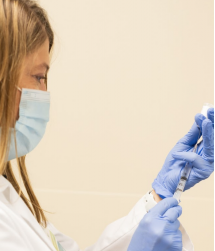Half of Kentucky adults who are reluctant to take the COVID-19 vaccine are open to changing their minds if they had more information. That’s according to a Foundation for a Healthy Kentucky Poll on Vaccines in Kentucky. Overall, 71 percent of Kentuckians had already received or intended to get the vaccine at the time of the poll.
“We’ve really got a shot at achieving herd immunity here in Kentucky,” said Ben Chandler, president and CEO of the Foundation for a Healthy Kentucky. “I’m encouraged that vaccine-hesitant people are willing to consider additional information about the vaccines. That’s why our current PSAs directly address common questions and concerns about the vaccines and respond clearly with scientific evidence.”
Public health leaders estimate that 70 to 85 percent of the population needs to be vaccinated before herd immunity is achieved. “The more contagious a disease, the higher the percentage it takes to reach herd immunity. The coronavirus is highly contagious; but, if we can reach the Kentuckians who are reluctant to get a COVID vaccine with facts and data, and half of them decide to get vaccinated, our Commonwealth would be in a much stronger position when it comes to herd immunity,” Chandler said.
The 29 percent of Kentuckians who said they would probably not or definitely not get the shot were more likely to be male, Republican, and live in suburban or rural communities.
One in three men (34 percent), four in ten Republicans (43 percent), and one-third of people living in suburban or rural communities (35 percent and 34 percent, respectively) reported they would probably not or definitely not get the vaccine.
By contrast, 76 percent of women, 87 percent of Democrats, 70 percent of Independents, and 80 percent of those living in an urban area already had or intended to take the vaccine.
Of those reluctant to get the vaccine, people open to changing their mind in time, and with additional information, included large proportions of Republicans, those living in suburban or rural communities, and high school graduates (Republicans – 47 percent, suburban counties – 50 percent, rural counties – 53 percent, high school graduates – 53 percent).
“We’re in a race against increasingly potent variations of the virus,” said Vivian Lasley-Bibbs, Foundation Board Chair and health equity expert. “The nature of viruses is to change, and mutant strains are already circulating within Kentucky’s population. The vaccines give you a level of protection from the mutant strains by reducing serious complications that could lead to death.”
Other trends of note:
• Health Status: About half of people who reported their health status as excellent/very good intended to get vaccinated (52 percent definitely or probably get it), while 1 in 3 said they would not (33 percent probably not or definitely not). Fifteen percent had already received the vaccine at the time of the poll.
Of those self-reporting as in good or fair/poor health, about 60 percent intended to get the vaccine while 1 in 4 said they probably or definitely would not get it. Sixteen percent of people self-reporting as in “good health” and 14 percent of those in “fair/poor health” had already received the vaccine.
• Education: More than 3 in 4 people who attended or graduated college had already received or intended to receive the vaccine. Meanwhile, about one-third of high school graduates and nearly half of people with less than a high school degree did not intend to get vaccinated.
• Age: Older people were more likely to have already received or intend to get the shot (85 percent for those 65 years+ and 75 percent for those 46 – 64 years). And, while 37 percent of those under 45 years old said they probably or definitely will not get the vaccine, nearly a third of those ages 30 – 45 years said they definitely will not get it, compared with 21 percent of those 18 – 29 years old.
Split Motivations
The poll also found Kentuckians split on whether getting a COVID-19 vaccine is a personal choice or part of everyone’s responsibility to protect the health of the community (48 percent and 49 percent, respectively).

Those who see the vaccine as a personal choice include:
• People with less than a high school degree (74 percent)
• Republicans (64 percent)
• Independents (54 percent)
• People living in rural communities (55 percent)
Those who see the vaccine as a community responsibility include:
• Those with some college (57 percent)
• People with college degrees (54 percent)
• Democrats (71 percent)
• People living in urban areas (56 percent)
“This is helpful information in terms of what messages will resonate best with Kentuckians,” Chandler said. “To increase our vaccine rates, we have to speak to what motivates people.”
The Vaccines in Kentucky – The Foundation for a Healthy Kentucky Poll was conducted February 11 – March 12, 2021 by the Institute for Policy Research at the University of Cincinnati. More than 800 adults from throughout Kentucky were polled by telephone and includes a +/- 3.5 percent margin of error. The poll was funded by the Foundation for a Healthy Kentucky.
The Foundation intends to survey the same people later this year to see if their intentions have changed.
Foundation for a Healthy Kentucky

























